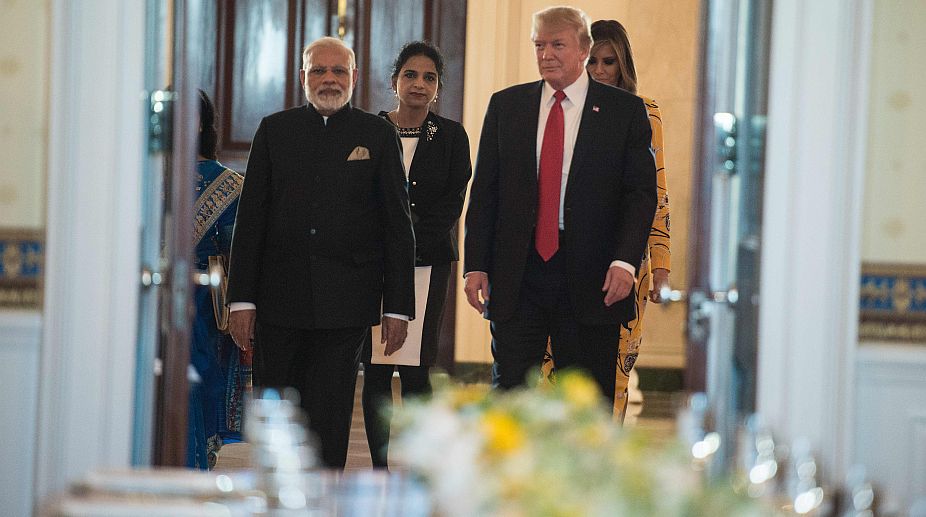Congress committing dacoity on rights of OBCs, SCs, STs: PM
“Wherever it (Congress) can do it, it will try to loot the claims of the SCs, STs and OBCs and give them to others,” said Modi.

Prime Minister Narendra Modi, US President Donald Trump (R) (PHOTO: AFP)
In a no-holds-barred attack on Islamabad on the issue of terrorism, India and the United States asked Pakistan to ensure that its territory was not used to launch terror attacks on other countries and, in an obvious reference to China’s controversial Belt Road Initiative (BRI), called upon all nations to adhere to the principle of sovereignty and territorial integrity while undertaking regional economic connectivity projects.
In a joint statement issued at the end of marathon talks between Prime Minister Narendra Modi and US President Donald Trump, the two countries also called on Pakistan to expeditiously bring to justice the perpetrators of the 26/11 Mumbai, Pathankot and other cross-border terrorist attacks perpetrated by Pakistan-based groups.
The two countries resolved to strengthen cooperation against terrorist threats from groups, including Al-Qaeda, ISIS, Jaish-e-Mohammed, Lashkar-e-Taiba, D-Company and their affiliates. They announced increased cooperation to prevent terrorist travel and to disrupt recruitment efforts by expanding intelligence-sharing and operational level counter-terrorism cooperation. They also resolved to strengthen information exchange on plans, movement and linkages of terrorist groups and their leaders as well as on raising and moving of funds by terrorist groups.
Advertisement
Reiterating that India had got a ‘true friend’ in the White House, President Trump, at a joint media interaction with PM Modi, noted that both India and the US had been affected by the evils of terrorism and were determined to destroy terrorist organisations and the radical ideology that drove them.
On his part, Modi said he had discussed with President Trump the threat of terrorism, extremism and radicalisation, which were major challenges facing the world today. ‘’Fighting terrorism and doing away with the safe shelters, sanctuaries and safe havens will be an important part of our cooperation,’’ he declared.
As the two leaders shook hands and hugged each other at the end of their media appearance at the Rose Garden in the White House, their two delegations skirted some of the thorny issues like H-1 B visas, immigration and climate change in the joint statement even as the document spoke at length about defence, economic and nuclear energy cooperation.
From India’s point of view, the PM’s visit, which began with low expectations given the unpredictable nature of the current occupant of the White House, seems to have gone off well as was evident from the personal chemistry the two leaders were able to strike. ‘’This was one of the most productive prime ministerial visits to the US,’’ according to Foreign Secretary S Jaishankar.
The language of the joint statement on terrorism is much stronger than the one used in the previous statements issued by the two sides.The tone for the Trump-Modi talks was set by Washington when it designated Hizb-ul-Mujahideen leader Syed Salahuddin, who had vowed to turn the Kashmir valley into a "graveyard for India forces", as a global terrorist hours before the two leaders met.
Though there was no mention of China by name in the joint statement, the two countries made it abundantly clear that they were not enthused by the aggressive stance taken by Beijing against its neighbours in the South China Sea by reiterating the importance of respecting freedom of navigation, over-flight and commerce in the Indo-Pacific region. In a veiled reference to China’s BRI initiative, the two countries called upon all nations to adhere to the principle of sovereignty and territorial integrity while bolstering regional economic connectivity.
The two countries pledged to deepen defence and security cooperation, building on America’s recognition of India as a major defence partner. Reflecting the partnership, the US offered for India’s consideration the sale of Sea Guardian Unmanned Aerial Systems, which would enhance the country's capabilities.
On economic cooperation, the two sides noted that extensive economic and tax reforms launched in their respective countries would unlock immense economic opportunities and committed themselves to further expanding and balancing the trade relationship and to removing obstacles to growth and job creation.
Regarding energy cooperation, the joint statement said the two leaders looked forward to conclusion of contractual agreements between Westinghouse Electric Company and the Nuclear Power Corporation of India for six nuclear reactors in India and also related project financing.
Advertisement